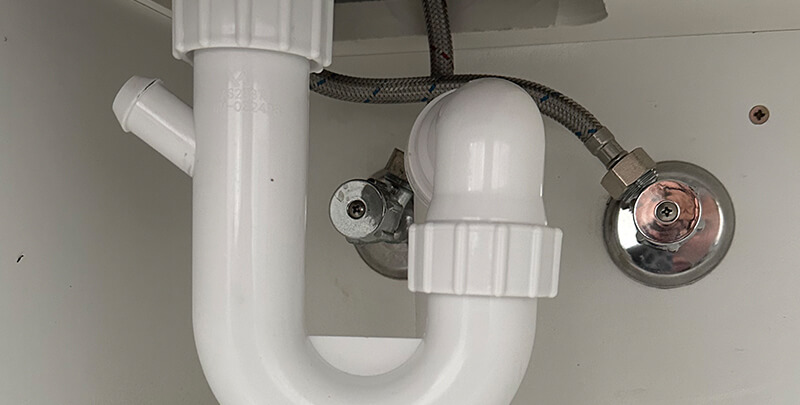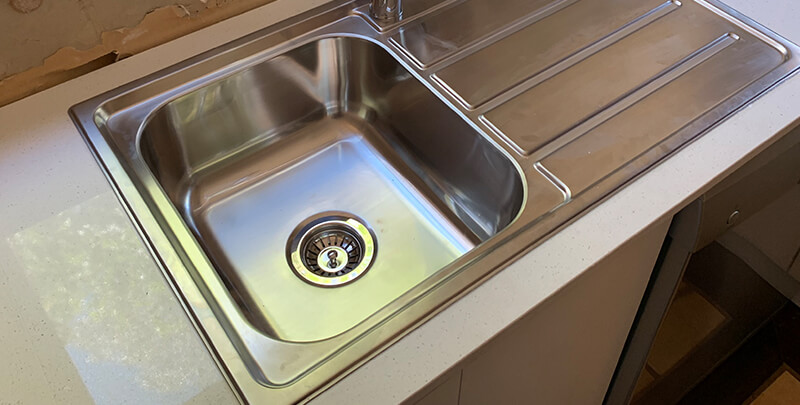
Clearing Clogged Drains: Effective Strategies for a Smooth-Flowing System
Addressing stubborn clogs can be a nuisance, causing inconvenience and potential damage when dealing with clogged drains.
This article will explore practical strategies to clear clogged drains and keep your plumbing system in optimal condition. But before we dive into the solutions, let’s understand the common causes of drain clogs.
Clogged drains can occur due to various reasons. The most common culprits are the accumulation of hair, soap residue, food scraps, grease, and mineral build up over time.
These substances can block the pipes and hinder the smooth flow of water through drain plumbing, leading to slow drains or complete blockages.
Understanding Drain Clogs
Different types of drains in your home, such as kitchen sinks, bathroom sinks, and shower drains, can experience unique clogging issues.
Kitchen sinks often suffer from grease and food debris buildup, while bathroom sink drains are prone to hair and soap scum accumulation.
It’s essential to recognise the signs of a clogged drain, which include slow drainage, gurgling sounds, unpleasant odours, or water backing up.

DIY Methods for Clearing Clogged Drains
When faced with a clogged drain, you can try several do-it-yourself (DIY) methods before considering professional help. Let’s explore some effective techniques:
- Boiling water: One of the simplest methods is pouring boiling water down the drain. Boil water in a kettle and carefully pour it down the clogged drain; pour boiling water in two to three stages, allowing the hot water to work for a few seconds between each pour. It can help break down grease and other minor clogs.
- Baking soda and vinegar: This natural combination can create a foaming reaction in toilet drains that helps dislodge minor clogs. Start by pouring a cup of baking soda down the drain, followed by a cup of white vinegar. Let the mixture sit for about 30 minutes, then flush it with hot water.
- Salt and hot water: Mix half a cup of table salt with boiling water and pour it down the drain. Let it sit for a few minutes, then flush it with hot water. The abrasive action of hot tap water on the salt can help break up clogs.
- Plunger: A plunger can help clear clogs in sinks, showers, or bathtubs. Ensure enough water to cover the bottom of the plunger, and then create a seal over the drain. Pull the plunger up and down quickly for about 20-30 seconds to generate pressure and dislodge the drain clog first.
- Wire coat hanger: Straighten out a wire coat hanger and create a small hook at one end. Please insert it into the drain carefully and try to hook or break up the clog. Be gentle to avoid damaging the drain pipes further.
- DIY drain snake: You can make a DIY drain snake using a long, flexible object like a plastic bottle brush or a piece of flexible plastic tubing. Please insert it into the empty drain pipe and twist, push, and pull to dislodge the clog.
- Wet/dry vacuum: If you have a wet/dry vacuum, you can use it to suck out the clog. Seal the vacuum nozzle over the drain and create a tight seal to unclog the drain. Set it to vacuum liquids and turn it on for a few seconds to see if it removes the clog.
Remember that these methods are more suitable for minor clogs. If you have a severe or persistent clog, it’s best to consult a professional plumber to avoid causing further damage to your plumbing system. Additionally, always take safety precautions and use appropriate tools when attempting DIY plumbing fixes.
Preventive Measures to Avoid Clogged Drains
To prevent blockages occurring in your drains and keep your plumbing system in good working condition, here are some preventive measures you can take:
- Use drain screens: Place drain screens or filters over all your sink, shower, and bathtub drains. These screens will catch hair, soap scum, dish soap, food particles, and other debris, preventing them from going down the drain and causing blockages.
- Dispose of waste properly: Avoid pouring grease, oil, or coffee grounds down the kitchen sink, as they can solidify and clog the drain over time. Dispose of these items in the trash or garbage disposal, or use designated recycling facilities if available.
- Regularly clean drains: Clean your drains regularly to remove accumulated gunk and debris. Pouring boiling water down the drain once a week can help dissolve minor build up. You can also use baking soda, vinegar, and hot water to clear out mild clogs.
- Use a plumber’s snake: Use a plumber’s snake or drain auger to dislodge and remove any blockages that cannot be easily dissolved with water and cleaning agents if you notice a slow drain.
- Avoid flushing non-biodegradable items: Teach everyone in your household not to flush non-biodegradable items in the toilet, such as wet wipes, cotton balls, dental floss, and sanitary products. Flush only human waste and toilet paper.
- Install a lint trap: Install a lint trap on the drain hose for washing machines to catch lint and debris from laundry water. Clean the lint trap regularly to maintain its effectiveness.
- Trim tree roots: If trees are near your sewer lines, regularly trim their roots to prevent them from infiltrating and obstructing the pipes.
- Regular professional inspections: Schedule regular inspections by a professional plumber to identify potential issues before they become significant problems. They can use cameras to inspect the pipes and identify any blockages or damage.
- Be mindful of what you wash: Be cautious about what you wash down the drain. For instance, avoid rinsing large amounts of hair or pet fur down the bathroom or sink drain.
- Properly dispose of household chemicals: Avoid pouring harsh chemicals down the drain, as they can damage pipes and contribute to clogs. Dispose of chemicals safely according to local regulations.
Following these preventive measures can significantly reduce the likelihood of clogged drains and keep your plumbing system running smoothly. If you encounter persistent or severe clogs, it’s best to seek professional assistance to address the issue effectively.

Addressing Drain Clogs Promptly
Addressing drain clogs promptly is crucial to maintaining a smooth-flowing plumbing system. You can effectively clear clogged drains by following the DIY methods discussed, such as using boiling water, baking soda and vinegar, drain snakes or plungers.
Additionally, preventive measures like regular drain cleaning, maintenance, and proper waste disposal can help avoid future clogs and keep your plumbing system in excellent condition.
Remember, if DIY methods fail to clear the clog or you’re dealing with severe drain issues, it’s advisable to seek professional help from a plumber to prevent further damage.
Please note: This information is provided for advice purposes only. Regulations differ from state to state, so please consult your local authorities or an industry professional before proceeding with any work. See our Terms & Conditions here.